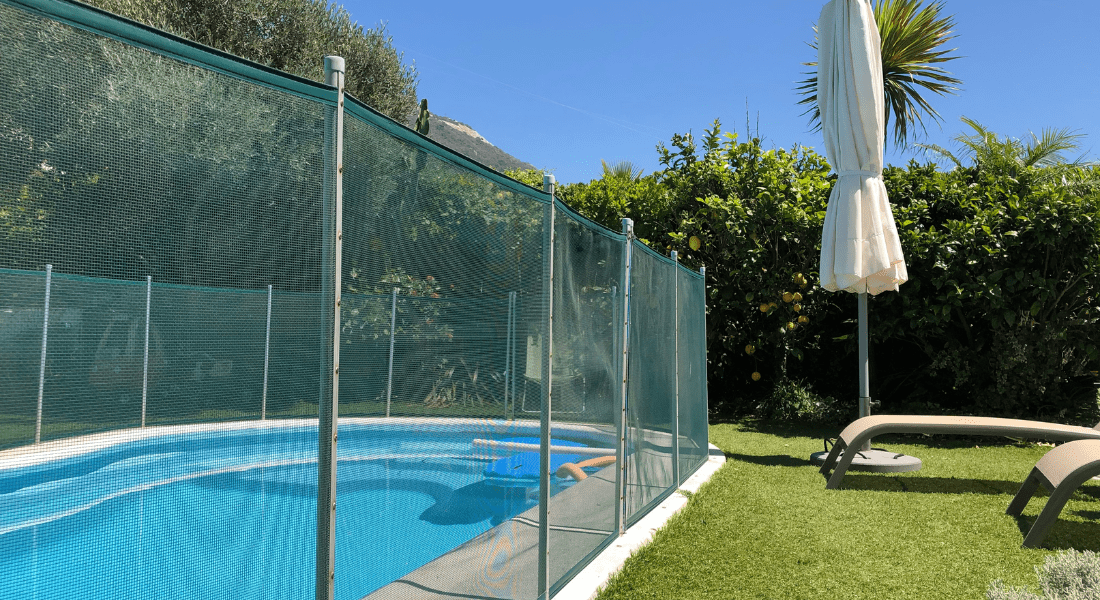Diving into the world of pool safety can feel overwhelming, but it’s a crucial step in safeguarding your loved ones. In this comprehensive guide, we’ll explore everything you need to know about pool fences, installation, and supervision to prevent the devastating tragedy of child drowning. Whether you’re a seasoned pool owner or considering installing one, this article is worth your time to ensure you’re equipped with the knowledge to keep your pool area secure and your family safe.
Understanding the Importance of Pool Safety
The allure of a swimming pool can’t be denied, but it comes with inherent risks, especially for families with small children. According to recent statistics, drowning is one of the leading causes of unintentional death for children 1-4 years old, making pool safety a top priority for any parent or guardian. Installing a pool fence is not just a convenience; it’s a crucial layer of protection that significantly reduces the risk of accidents.
Choosing the Right Fence: What to Consider
Material Matters
The material of your pool fence is perhaps one of the most critical considerations. It determines not only the fence’s durability but also its appearance and maintenance requirements. Common materials for pool fences include aluminum, vinyl, wood, and mesh. Aluminum and vinyl are popular choices due to their durability, resistance to corrosion, and low maintenance requirements. Wood fences can provide a more natural look but may require more upkeep to prevent warping or rotting. Mesh pool fences offer excellent durability and visibility, making them an attractive option for families with small children.
Height for Safety
The height of your pool fence is another crucial factor in ensuring its effectiveness. Most regulations recommend a minimum fence height of 4 feet to prevent children from easily climbing over. However, taller fences, such as those measuring 5 or 6 feet, may provide added security, especially in areas with larger or more adventurous children. When choosing the height of your pool fence, consider the age and behavior of your children, as well as any local regulations that may dictate minimum height requirements.
Design Considerations
The design of your pool fence not only affects its aesthetic appeal but also its functionality and safety. Opting for a fence with minimal horizontal bars or gaps can prevent children from using them as footholds for climbing. Mesh pool fences, in particular, offer a see-through design that provides unobstructed views of the pool area while still maintaining security. Additionally, choosing a fence with self-closing and self-latching gates adds an extra layer of safety by ensuring that the pool area remains securely enclosed, even when unattended.
Types of Pool Gates
Pool gates come in various styles, each with its own set of features and benefits. From self-closing mechanisms to key-lockable options, choosing the right gate depends on your specific needs and preferences. Consider factors such as convenience, accessibility, and the ability to resist tampering when selecting a pool gate for your backyard.
Durability and Maintenance
Investing in a durable pool fence is essential to ensure its long-term effectiveness and safety. Aluminum and vinyl fences are known for their durability and resistance to rust, corrosion, and fading, making them ideal choices for outdoor environments. Wood fences can also be durable but may require regular maintenance, such as staining or sealing, to prevent deterioration. Mesh pool fences are typically made from high-quality, UV-resistant materials that withstand harsh weather conditions and maintain their integrity over time with minimal maintenance.
Budget Considerations
Finally, consider your budget when choosing a pool fence. While it’s essential to prioritize safety and durability, there are options available to suit a range of budgets. Aluminum and vinyl fences are generally more affordable than wood or wrought iron fences, while mesh pool fences offer a cost-effective solution without compromising on safety or quality. Consider the long-term value of your investment, weighing the upfront cost against the durability and lifespan of the fence.
The Installation Process: Step-by-Step Guide
Preparation
Before you begin the installation process, it’s essential to gather all the necessary tools and materials. Check the contents of your pool fence kit to ensure that you have everything you need, including fence panels, posts, gate hardware, and installation instructions. Additionally, take the time to measure your pool area accurately and mark the locations for the fence posts.
Estimating Materials
Once you’ve determined the layout of your pool fence, you’ll need to estimate the quantity of materials required. This includes calculating the number of fence panels, posts, and gates needed to enclose your pool area effectively. Consider factors such as the length of each fence panel, the spacing between posts, and any additional features, such as self-closing gates or locking mechanisms.
Preparing the Ground
Before installing the fence posts, prepare the ground by clearing away any debris or vegetation from the area where the posts will be placed. Use a shovel or post hole digger to create holes for the fence posts, ensuring that they are evenly spaced and aligned according to your layout plan. The depth of the holes will depend on the type of soil and the height of your fence, but generally, they should be at least 1/3 of the post’s length.
Installing the Fence Posts
Once the holes are prepared, it’s time to install the fence posts. Place each post into its respective hole, making sure that it is level and plumb. Use concrete or gravel to secure the posts in place, filling the holes and tamping down the material to ensure stability. Allow the concrete to cure fully before proceeding to the next step.
Attaching the Fence Panels
With the fence posts in place, it’s time to attach the fence panels. Follow the manufacturer’s instructions carefully, ensuring that each panel is securely attached to the posts. Use screws or brackets to affix the panels to the posts, checking for level and alignment as you go. Pay special attention to any corners or changes in elevation, making sure that the panels are properly adjusted to maintain a continuous barrier around the pool area.
Installing Gates and Hardware
If your pool fence includes gates, now is the time to install them. Position the gate posts according to your layout plan, making sure that they are level and aligned with the fence panels. Attach the gate hardware, including hinges, latches, and locks, following the manufacturer’s instructions carefully. Test the operation of the gates to ensure that they open and close smoothly and securely.
Final Inspection and Compliance
Once the fence is fully installed, take a final inspection to ensure that everything is secure and in compliance with local regulations. Check for any loose or missing components, and make any necessary adjustments to ensure that the fence is sturdy and effective. If required by law, contact relevant authorities to schedule an inspection and obtain any necessary permits or approvals.

Supervision: The Key to Preventing Accidents
While a pool fence is crucial for safety, it’s not enough on its own. Active supervision is essential whenever children are near the pool, whether or not there’s a fence. Enforcing rules like no running or diving and learning CPR are important for a safer swimming environment. Education is key too. Teaching kids learning how to swim early, reinforcing pool safety rules, and regularly practicing safety drills empowers your family to stay safe. Pets are part of the family too, so their safety around the pool matters. Installing a pet fence or gate keeps them out of harm’s way. Training pets to stay away from the pool area and providing other water sources reduces the risk of accidents further.
Regulations and Compliance: What You Need to Know
Navigating the regulations and compliance standards for pool fences can be overwhelming, but it’s essential for ensuring the safety of your loved ones. Familiarize yourself with local laws and regulations regarding pool safety and ensure your fence meets or exceeds these requirements. Consulting with relevant authorities can provide clarity and peace of mind regarding your pool’s compliance.
Choosing Sutton Pools for Your Pool Fence Installation
At Sutton Pools, we understand the importance of exceptional customer service when it comes to ensuring the safety of your family. As a reputable Clarksville pool installation contractor, we prioritize every step of the process, from initial estimates to post-installation support. Our commitment to reliable customer service sets us apart, ensuring a seamless experience for you and your loved ones. Contact us today to start building your dream pool!
Conclusion:
- Always actively supervise children around the pool.
- Choose a pool fence made of sturdy materials like vinyl-coated mesh.
- Opt for self-closing and self-latching gates for added security.
- Prioritize customer service when selecting a provider for your pool fence installation.
- Educate yourself and your family about water safety and the importance of pool supervision.
By following these guidelines and prioritizing pool safety, you can enjoy your pool with peace of mind, knowing you’ve taken the necessary steps to protect your loved ones from the preventable tragedy of drowning. Remember, when it comes to pool safety, there’s no room for compromise.
FAQ
What makes a good pool fence?
A good pool fence is one that prioritizes safety and durability. It should be at least 4 feet tall with no footholds or handholds for climbing. The spacing between vertical posts should be narrow enough to prevent children from squeezing through. Self-closing and self-latching gates are essential features to ensure the fence remains closed and secure at all times. Additionally, the material should be sturdy and resistant to corrosion, such as aluminum or vinyl-coated mesh.
What are the requirements for a pool fence in Tennessee?
In Tennessee, the requirements for a pool fence vary depending on local regulations. However, some common requirements include having a fence at least 4 feet tall with no gaps larger than 4 inches between vertical posts. Gates should open outward from the pool area and have self-closing and self-latching mechanisms. It’s essential to check with local authorities to ensure compliance with specific regulations in your area.
What is the safest pool fence?
The safest pool fence is one that meets all safety standards and is installed correctly. Mesh pool fences are often considered among the safest options because they are climb-resistant and offer good visibility, allowing parents to supervise their children easily. Additionally, self-closing and self-latching gates add an extra layer of security to prevent unauthorized access to the pool area.
Is there a law about fences around pools?
Yes, many jurisdictions have laws or regulations governing the installation of fences around pools. These laws are designed to prevent accidents and drownings by ensuring that pools are adequately secured. Requirements typically include specific height and design specifications for the fence, as well as regulations regarding gate operation and maintenance. It’s crucial to familiarize yourself with local laws and regulations to ensure compliance and, more importantly, to keep your pool area safe for everyone.


